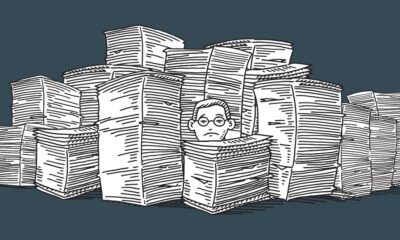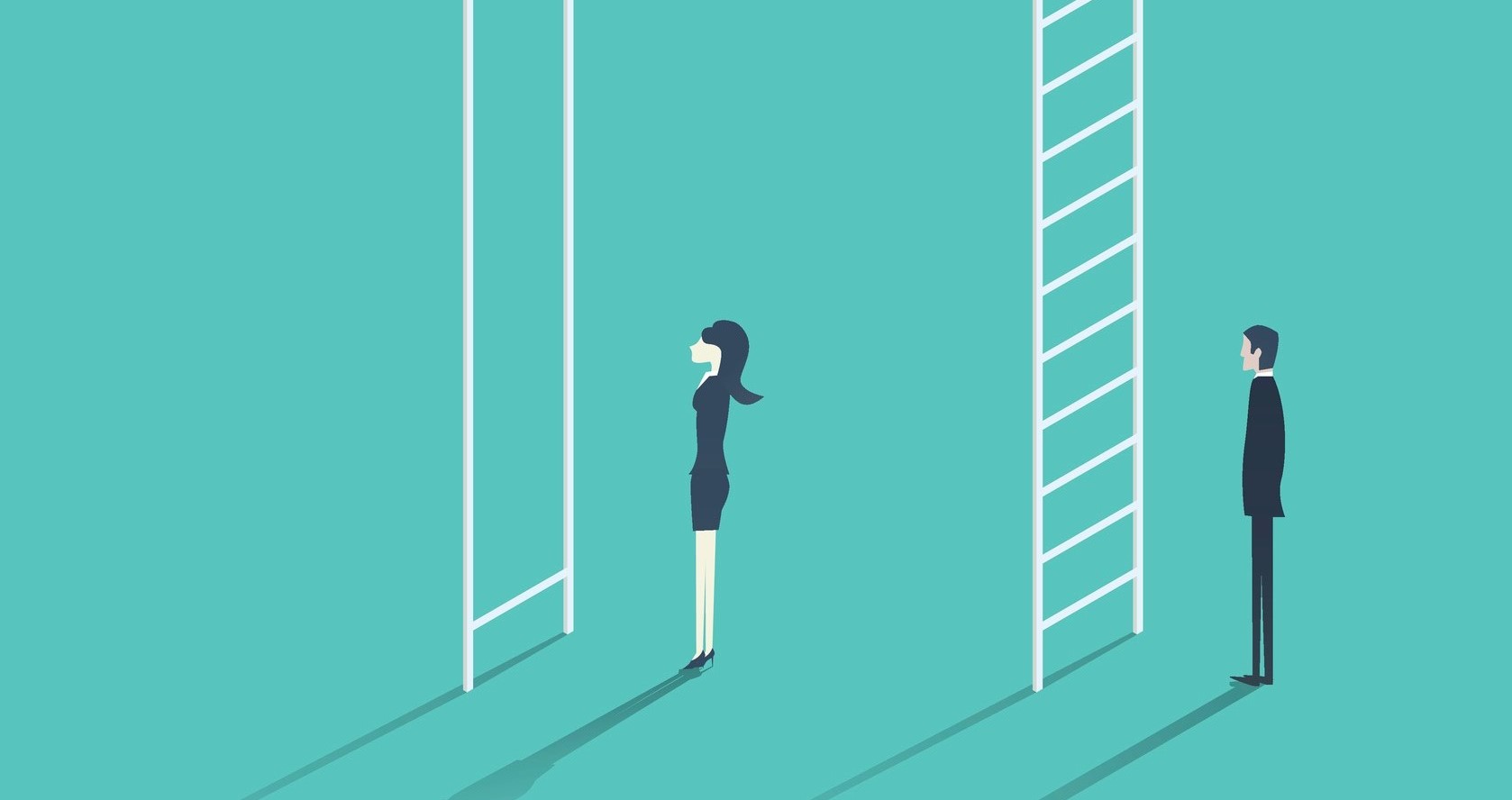
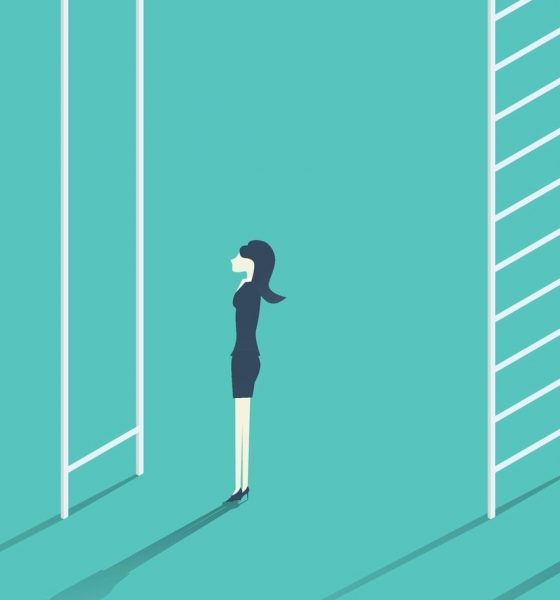
Society
A society where men and women were never treated as equals
The phenomenon of gender inequality in the Republic of Moldova causes a state budget loss of about 39 billion lei. “If economic inequalities between men and women were eliminated, the country’s GDP would grow by up to 20%,” is claimed in the study “Economic Cost of Gender Inequalities in the Republic of Moldova” conducted by Expert-Grup in partnership with the Women’s Law Centre and with the financial support of Sweden.
Women are not helped to overcome their main challenge.
The Expert-Grup study emphasized that women have to face difficulties in getting back to work after giving birth due to “the design of relevant policies, shortage of quality nursery services, inflexible attitude of employers, as well as tradition, cultural peculiarities and gender prejudices that determine women to give up on their professional activity.”
According to the authors of the study, there are no legal provisions that would motivate men and women to share the childcare leave. There are extremely few nurseries available and the decision to use nursery services face judgement and social pressure in Moldova. That forces women to give up on their professional career, to work less, to be less productive than men.
“In our culture, mothers who take their little children to a nursery are viewed as bad mothers. I sent my elder child aged 1 year and 8 months to a nursery in another settlement, because I started to work, and the majority of the relatives criticised me for that. “
The figures from the National Social Insurance House presented that there are 5.5 times fewer fathers than mothers who took partially paid childcare leave and were receiving monthly childcare allowance, as of 1 January 2020.
Moreover, in 2019, the Republic of Moldova had only two nurseries (for children aged 1-2 years) and both of them were located in the urban area. There were 829 nursery-kindergartens with 110 951 children enrolled.
“Gender inequality hinders the progress of any society as it restricts the opportunities of half of its population. When women are prevented from reaching their maximum potential, that very same potential is lost for the entire society,” said Virginia Bilici, Program Coordinator at the Embassy of Sweden in the Republic of Moldova.
Women work more, but earn less.
It was estimated that, at the global level, women do 3 times as much unpaid care and domestic work as men. “Rising demand for care in the context of the COVID-19 crisis and response will likely deepen already existing inequalities in the gender division of labour, placing disproportionate burden on women and girls,” said the UN Women report on COVID-19 and Care Economy.
Svetlana Andries, Coordinator of UN Women Moldova programs, mentioned that the COVID-19 pandemic has created disparities that affect women even more, taking into consideration that Moldovan women already had a double amount of tasks to perform before the pandemic. The situation is even worse in the case of mothers with several children, as they have to take on additional roles of educators or teachers.
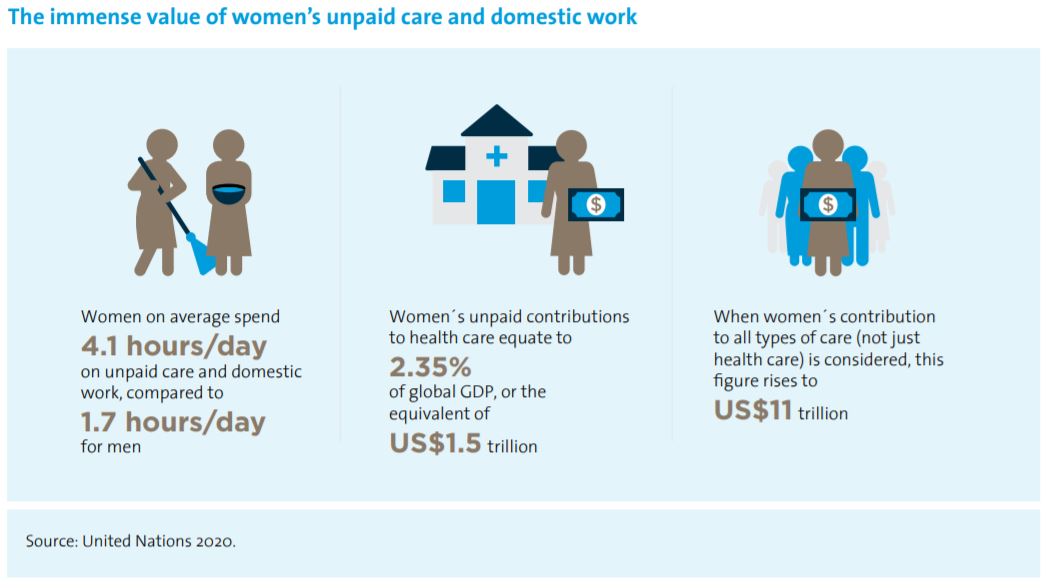
In the Republic of Moldova, the biggest issues related to the gender gap are related to patriarchal attitudes, which limit educational choices and employment options for women, mostly unrecorded and undeclared discriminatory practices, unequal sharing of work and family responsibilities, as well as stigmas of being weak or dependant on men.
According to the study “Men and gender equality in the Republic of Moldova” conducted by Women’s Law Center and Center for Investigation and Consultation “SocioPolis”, cooking, cleaning and laundry are merely performed by women in Moldova.
5.9% of fathers declared that they were never involved in childcare, 18.9% – in cooking, 29.6% – in cleaning and 44.9% – in laundry.
See also: Talking about gender equality on International Women’s Day
At the same time, men’s salary was 14.4% higher as compared to the average salary of women in 2019, according the data provided by the National Bureau of Statistics (NBS).
Women with children had 20.4% less paid economic activities than women without children and 16.4% less than men with children.
All over the world, women are paid, on average, 16% less than men and only 1 in 4 managers are women, as the 2020 UN Women Report on Gender Equality presented. Still, Moldova is among the countries with relatively low differences in income between genders. The Global Gender Gap Report stated that, the country has closed 74.9% of its gender pay gap, along with Slovenia (80.9%) and Lithuania (76.3%).
Experts claim that things could change in the future if the family and school education would focus on gender equality, girls being encouraged and motivated to strive for key positions, just as men, and the boundaries between men and women professions and/or activities would be erased from a very young age of children. Also, women would need to encourage their partners to share more of the household tasks.
Women skills in STEM industries are very often underestimated.
When asked about which fields they want a career in, the girls participating in a study conducted by UN Women Moldova, Girls Go IT and the Government of Sweden, through Magenta Consulting, named the following:
- beauty services (26%);
- public catering and food industry (16%);
- economy (15%)
Only 3% of the interviewed girls (aged between 14 and 18) want to pursue a career in IT.
As compared to the global level, where about 30% of people in the STEM industries (Science, Technology, Engineering and Mathematics) were women, the share of Moldovan women working in these industries was 48.5% in 2019. That ranks Moldova the 6th in Europe, according to data provided by the UNESCO Institute for Statistics.
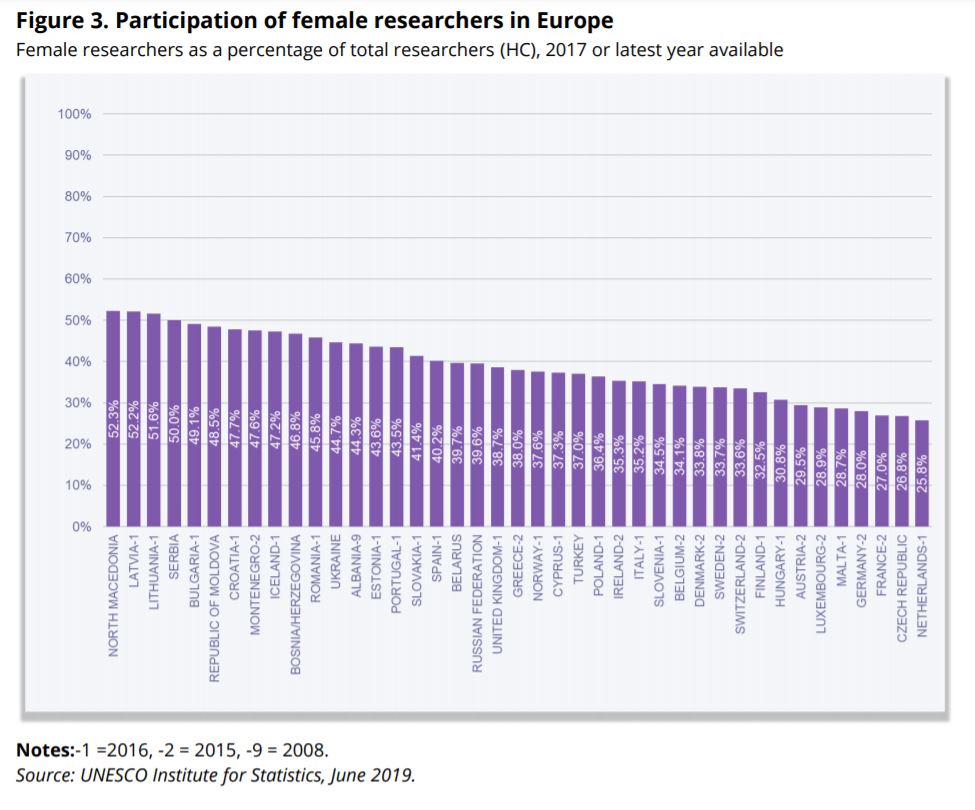
The yet low share of women who choose to study and pursue a career in the STEM industries is conditioned by legislative initiatives that would facilitate equal access for both women and men, business and research environment that would encourage women by paying them the same as men and society’s preconceptions about what is a right job for a woman and what is not.
Business and politics are still considered “not for women”.
The 2020 Global Gender Gap Report showed that the Republic of Moldova offers equal opportunities when it comes to access to health and education. However, in such aspects as political empowerment and equal professional opportunities the equal rights are not so equal anymore.
In Moldova, women’s participation in entrepreneurship has increased in the last years, but still women own and manage just a third of enterprises, concluded a study conducted by the NBS in 2018. The study findings revealed that women own micro-businesses more frequently than men (90.3% versus 82.3%) and rarely own medium and large businesses (1.3% versus 3.3%).
Women entrepreneurs benefit less from support programs as compared to men entrepreneurs. At national level, only 23.8% of women receive support, compared to 33.9% for men. However, women are able to grow their businesses faster and create more jobs.
When it comes to politics, only 25.7% of MPs in Moldova and 40.5% of legislators, senior officials and managers are represented by women. According to the data presented by the Central Election Commission, with the support of UNDP Moldova, a number of 196 women became mayors after the last local elections in 2019, which represented 22% of the total number of elected mayors.
On November 15, the second round of presidential elections will be held in Moldova. Citizens will have to choose among Igor Dodon and Maia Sandu. Even though there are a lot of stereotypes and preconceptions about women in politics (especially about unmarried women without children) and even though a lot of lies are now thrown by the male candidate, chances are that Moldova will elect its first female president in the history and it will be next in the list of countries that have a woman as a representative political leader.
Photo: itbrief.com.au
Society
“They are not needy, but they need help”. How Moldovan volunteers try to create a safe environment for the Ukrainian refugees

At the Government’s ground floor, the phones ring constantly, the laptop screens never reach standby. In one corner of the room there is a logistics planning meeting, someone has a call on Zoom with partners and donors, someone else finally managed to take a cookie and make some coffee. Everyone is exhausted and have sleepy red eyes, but the volunteers still have a lot of energy and dedication to help in creating a safe place for the Ukrainian refugees.
“It’s like a continuous bustle just so you won’t read the news. You get home sometimes and you don’t have time for news, and that somehow helps. It’s a kind of solidarity and mutual support,” says Vlada Ciobanu, volunteer responsible for communication and fundraising.
The volunteers group was formed from the very first day of war. A Facebook page was created, where all types of messages immediately started to flow: “I offer accommodation”, “I want to help”, “I want to get involved”, “Where can I bring the products?”, “I have a car and I can go to the customs”. Soon, the authorities also started asking for volunteers’ support. Now they all work together, coordinate activities and try to find solutions to the most difficult problems.
Is accommodation needed for 10, 200 or 800 people? Do you need transportation to the customs? Does anyone want to deliver 3 tons of apples and does not know where? Do you need medicine or mobile toilets? All these questions require prompt answers and actions. Blankets, sheets, diapers, hygiene products, food, clothes – people bring everything, and someone needs to quickly find ways of delivering them to those who need them.
Sometimes this collaboration is difficult, involves a lot of bureaucracy, and it can be difficult to get answers on time. “Republic of Moldova has never faced such a large influx of refugees and, probably because nobody thought this could happen, a mechanism of this kind of crisis has not been developed. Due to the absence of such a mechanism that the state should have created, we, the volunteers, intervened and tried to help in a practical way for the spontaneous and on the sport solutions of the problems,” mentions Ecaterina Luțișina, volunteer responsible for the refugees’ accommodation.
Ana Maria Popa, one of the founders of the group “Help Ukrainians in Moldova/SOS Українці Молдовa” says that the toughest thing is to find time and have a clear mind in managing different procedures, although things still happen somehow naturally. Everyone is ready to intervene and help, to take on more responsibilities and to act immediately when needed. The biggest challenges arise when it is necessary to accommodate large families, people with special needs, for which alternative solutions must be identified.
Goods and donations
The volunteers try to cope with the high flow of requests for both accommodation and products of all kinds. “It came to me as a shock and a panic when I found out that both mothers who are now in Ukraine, as well as those who found refuge in our country are losing their milk because of stress. We are trying to fill an enormous need for milk powder, for which the demand is high and the stocks are decreasing”, says Steliana, the volunteer responsible for the distribution of goods from the donation centers.
Several centers have been set up to collect donations in all regions of Chisinau, and volunteers are redirecting the goods to where the refugees are. A system for processing and monitoring donations has already been established, while the volunteer drivers take over the order only according to a unique code.
Volunteers from the collection centers also do the inventory – the donated goods and the distributed goods. The rest is transported to Vatra deposit, from where it is distributed to the placement centers where more than 50 refugees are housed.
When they want to donate goods, but they don’t know what would be needed, people are urged to put themselves in the position of refugees and ask themselves what would they need most if they wake up overnight and have to hurriedly pack their bags and run away. Steliana wants to emphasise that “these people are not needy, but these people need help. They did not choose to end up in this situation.”
Furthermore, the volunteer Cristina Sîrbu seeks to identify producers and negotiate prices for products needed by refugees, thus mediating the procurement process for NGOs with which she collaborates, such as Caritas, World Children’s Fund, Polish Solidarity Fund, Lifting hands, Peace Corps and others.
One of the challenges she is facing now is the identifying a mattress manufacturer in the West, because the Moldovan mattress manufacturer that has been helping so far no longer has polyurethane, a raw material usually imported from Russia and Ukraine.
Cristina also needs to find solutions for the needs of the volunteer groups – phones, laptops, gsm connection and internet for a good carrying out of activities.
Hate messages
The most difficult thing for the communication team is to manage the hate messages on the social networks, which started to appear more often. “Even if there is some sort of dissatisfaction from the Ukrainian refugees and those who offer help, we live now in a very diverse society, there are different kind of people, and we act very differently under stress,” said Vlada Ciobanu.
Translation by Cătălina Bîrsanu
Important
#WorldForUkraine – a map that shows the magnitude of the world’s actions against Russian aggression

The international community and volunteers from all over te world have launched #WorldForUkraine as a platform that shows the magnitude of the world’s actions against the Russian aggression. In a digital world – it is an interactive map of public support of Ukrainians under the hashtag #WorldForUkraine – rallies, flash mobs, protests around the world. In the physical dimension – it is your opportunity to take to the streets and declare: “No to Putin’s aggression, no to war.”
„Today, along with the political and military support, emotional connection with the civilized world and truthful information are extremely important for Ukraine. The power to do it is in your hands. Join the #WorldForUkraine project and contribute to the victorious battle against the bloodshed inflicted on Ukraine by the aggression of the Russian Federation”, says the „about the project” section of the platform.
Go to the streets — Tell people — Connect and Unite — Become POWERFUL
Volunteers have launched #WorldForUkraine as a platform that shows the magnitude of the world’s actions against Russian aggression. In digital world – it is an INTERACTIVE MAP of public support of Ukrainians worldforukraine.net under the hashtag #WorldForUkraine – rallies, flash mobs, protests around the world. In the physical dimension – it is your opportunity to take to the streets and declare: “No to Putin’s aggression, no to war.” There you may find information about past and future rallies in your city in support of Ukraine. This is a permanent platform for Ukrainian diaspora and people all over the world concerned about the situation in Ukraine.
So here’s a couple of things you could do yourself to help:
* if there is a political rally in your city, then participate in it and write about it on social media with geolocation and the hashtag #WorldForUkraine
* if there are no rallies nearby, organize one in support of Ukraine yourself, write about it on social media with geolocation adding the hashtag #WorldForUkraine
The map will add information about gathering by #WorldForUkraine AUTOMATICALLY
Your voice now stronger THAN ever
All rallies are already here: https://worldforukraine.net
Important
How is Moldova managing the big influx of Ukrainian refugees? The authorities’ plan, explained

From 24th to 28th of February, 71 359 Ukrainian citizens entered the territory of Republic of Moldova. 33 173 of them left the country. As of this moment, there are 38 186 Ukrainian citizens in Moldova, who have arrived over the past 100 hours.
The Moldovan people and authorities have organized themselves quickly from the first day of war between Russia and Ukraine. However, in the event of a prolonged armed conflict and a continuous influx of Ukrainian refugees, the efforts and donations need to be efficiently managed. Thus, we inquired about Moldova’s long-term plan and the state’s capacity to receive, host, and treat a bigger number of refugees.
On February 26th, the Ministry of Labor and Social Protection of Moldova approved the Regulation of organization and functioning of the temporary Placement Center for refugees and the staffing and expenditure rules. According to the Regulation, the Centers will have the capacity of temporary hosting and feeding at least 20 persons, for a maximum of 3 months, with the possibility of extending this period. The Centers will also offer legal, social, psychological, and primary medical consultations to the refugees. The Center’s activity will be financed from budget allocations, under Article 19 of Provision no. 1 of the Exceptional Situations Commission from February 24th, 2022, and from other sources of funding that do not contravene applicable law.
The Ministry of Inner Affairs and the Government of Moldova facilitated the organization of the volunteers’ group “Moldova for Peace”. Its purpose is to receive, offer assistance and accommodation to the Ukrainian refugees. The group is still working on creating a structure, registering and contacting volunteers, etc. It does not activate under a legal umbrella.
Lilia Nenescu, one of the “Moldova for Peace” volunteers, said that the group consists of over 20 people. Other 1700 registered to volunteer by filling in this form, which is still available. The group consists of several departments:
The volunteers’ department. Its members act as fixers: they’re responsible for connecting the people in need of assistance with the appropriate department. Some of the volunteers are located in the customs points. “The Ministry of Inner Affairs sends us every day the list of the customs points where our assistance is needed, and we mobilize the volunteers”, says Lilia Nenescu.
The Goods Department manages all the goods donated by the Moldavian citizens. The donations are separated into categories: non-perishable foods and non-food supplies. The volunteers of this department sort the goods into packages to be distributed.
The Government intends to collect all the donations in four locations. The National Agency for Food Safety and the National Agency for Public Health will ensure mechanisms to confirm that all the deposited goods comply with safety and quality regulations.
The Service Department operates in 4 directions and needs the volunteer involvement of specialists in psychology, legal assistance (the majority of the refugees only have Ukrainian ID and birth certificates of their children); medical assistance; translation (a part of the refugees are not Ukrainian citizens).
According to Elena Mudrîi, the spokesperson of the Ministry of Health, so far there is no data about the number of Covid-19 positive refugees. She only mentioned two cases that needed outpatient medical assistance: a pregnant woman and the mother of a 4-day-old child.
The Accommodation Department. The volunteers are waiting for the centralized and updated information from the Ministry of Labor about the institutions offering accommodation, besides the houses offered by individuals.
The Transport Department consists of drivers organized in groups. They receive notifications about the number of people who need transportation from the customs points to the asylum centers for refugees.
The municipal authorities of Chișinău announced that the Ukrainian children refugees from the capital city will be enrolled in educational institutions. The authorities also intend to create Day-Care Centers for children, where they will be engaged in educational activities and will receive psychological assistance. Besides, the refugees from the municipal temporary accommodation centers receive individual and group counseling.
In addition to this effort, a group of volunteers consisting of Ana Gurău, Ana Popapa, and Andrei Lutenco developed, with the help of Cristian Coșneanu, the UArefugees platform, synchronized with the responses from this form. On the first day, 943 people offered their help using the form, and 110 people asked for help. According to Anna Gurău, the volunteers communicate with the Government in order to update the platform with the missing data.
Translation from Romanian by Natalia Graur












